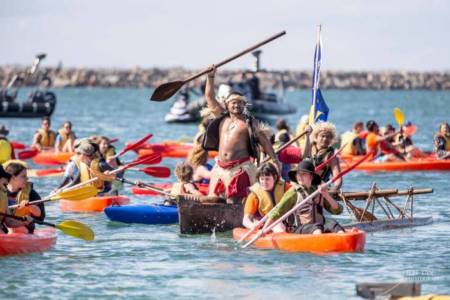While sea levels rise in the Pacific, huge droughts devastate and wildfires burn through Australia on a regular basis, a giant coal mine has been proposed right next to where Australia’s greatest environmental asset, the Great Barrier Reef, lies. Under the motto “We are not drowning, we are fighting”, Pacific climate activists are determined to stop it.
The Carmichael coal mine project, proposed by the Indian fossil fuel corporation Adani, will become one of the largest coal mines on the planet, covering an area of 200 square kilometres and producing 60 million tonnes of coal per year, all of which will be shipped through the Great Barrier Reef.
The coal deposit is part of the Galilee Basin, one of the world’s largest untapped coal reserves, where a further eight new coal mines have been proposed. If they go ahead, the coal from these projects would unleash 705 million tonnes of carbon dioxide into the atmosphere each year. This would more than double Australia’s annual coal production and burn through 5% of the world’s carbon budget.
To build and run its proposed Carmichael coal mine, Adani also wants to extract a billion litres of water per year from a river in drought-stricken central Queensland for decades to come.
Australia is a “carbon bomb” country – the biggest exporter of coal and liquid natural gas on Earth. While many of our closest neighbours are directly threatened by climate change, the federal government acts as a powerful advocate for the coal industry, ignoring the existential threats our Pacific neighbours face.
Australia and the Pacific Islands have already witnessed the destructive potential of climate change. Australia is currently in a record drought and massive wildfires have already ravaged parts of the east coast this winter. The summer ahead looks devastating. Surging storm fronts and sea level rise have even forced some Pacific Islands States to plan the relocation of their entire population within a few decades.
Unless we rapidly bring greenhouse gas emissions to zero and keep the planet from warming over 1.5o°C above pre-industrial levels, scientists estimate that 99% of coral reefs globally will be subject to coral bleaching annually. Opening up massive new coal fields and mines like the Adani mine will ensure we unleash the worst of climate change.
Despite the federal government’s determination to strongly support the Adani mine the, people of Australia have been fighting against it in one of the biggest community mobilisations ever seen. The #StopAdani movement have made the issue front page news, pressuring banks into withdrawing support to the project and galvanised a major new community revolt on climate change.
Over the past few years, the Pacific Climate Warriors, a network of young Pacific Islanders who are campaigning on the frontlines of climate change, have been strengthening their ties with the large diaspora community of Pacific Islanders in Australia. In the recent past, Pacific Climate Warriors from 12 Pacific Islands entered the port and coal terminal of Newcastle with their traditional hand-carved canoes to protest against the federal government.
In 2018 they have plans to knock on the doors of fellow Pacific Islanders and other Australian citizens to raise awareness on the threat that the Adani coal mine poses to lives, livelihoods and ecosystems in the Pacific.
“We have to find ways to keep coal and gas in the ground. People all around the world are recognising this and taking action to challenge the power of the fossil fuel industry. For us Pacific Islanders, there is nothing more urgent or necessary“ said Mikaele Maiava, Pacific Climate Warrior from Tokelau.
While the federal government is more than ever in the firm grip of the coal lobby, the opposition has so far been lukewarm in denouncing the Adani project and the sheer lack of climate action by the federal government. As federal elections get closer, activists plan to put the issue of climate change and the urgency of contrasting it by withdrawing any social license to the fossil fuel industry at the centre of the public debate in Australia.
“The decisions made by the Australian government will have a serious impact on the future for all Australians and our neighbours. It is up to us to ensure these decisions are made to protect us, not create greater threat” said Blair Palese, CEO of 350.org Australia.

